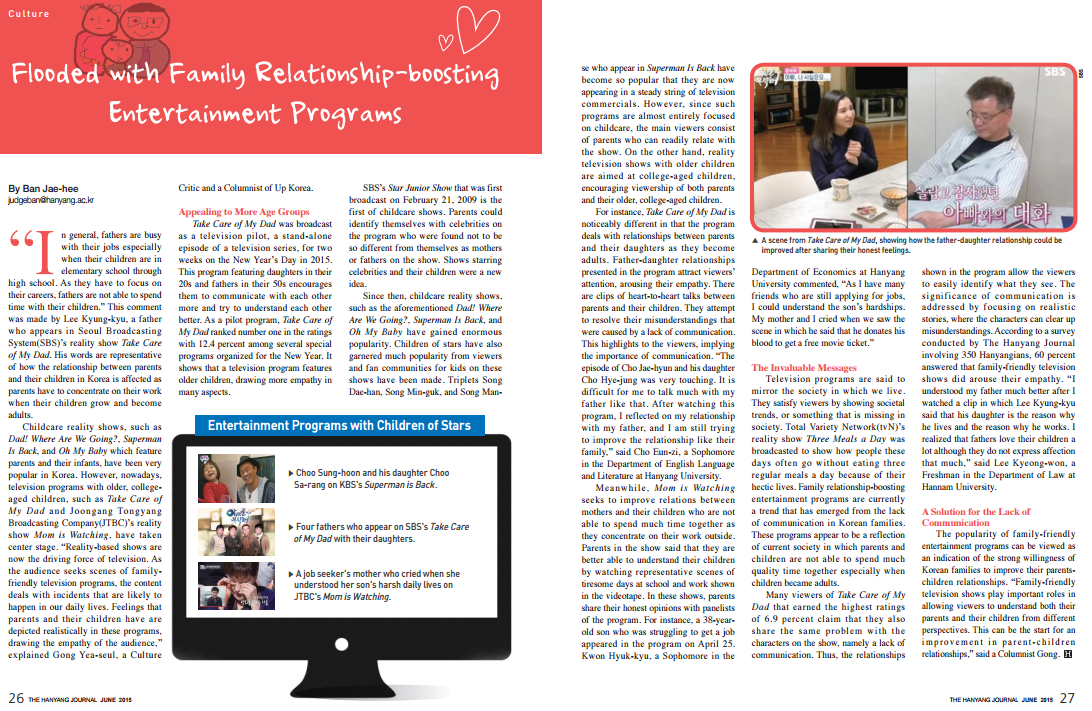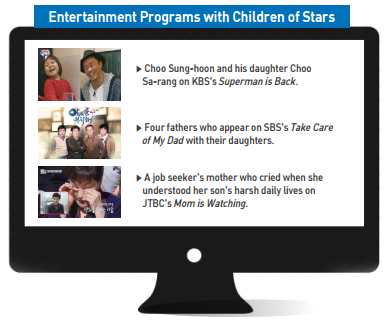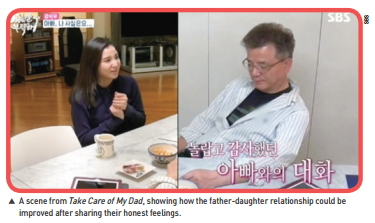
“In general, fathers are busy with their jobs especially when their children are in elementary school through high school. As they have to focus on their careers, fathers are not able to spend time with their children.” This comment was made by Lee Kyung-kyu, a father who appears in Seoul Broadcasting System(SBS)’s reality show Take Care of My Dad. His words are representative of how the relationship between parents and their children in Korea is affected as parents have to concentrate on their work when their children grow and become adults.
Childcare reality shows, such as Dad! Where Are We Going?, Superman Is Back, and Oh My Baby which feature parents and their infants, have been very popular in Korea. However, nowadays, television programs with older, collegeaged children, such as Take Care of My Dad and Joongang Tongyang Broadcasting Company(JTBC)’s reality show Mom is Watching, have taken center stage. “Reality-based shows are now the driving force of television. As the audience seeks scenes of familyfriendly television programs, the content deals with incidents that are likely to happen in our daily lives. Feelings that parents and their children have are depicted realistically in these programs, drawing the empathy of the audience,” explained Gong Yea-seul, a Culture Critic and a Columnist of Up Korea.

Appealing to More Age Groups
Take Care of My Dad was broadcast as a television pilot, a stand-alone episode of a television series, for two weeks on the New Year’s Day in 2015. This program featuring daughters in their 20s and fathers in their 50s encourages them to communicate with each other more and try to understand each other better. As a pilot program, Take Care of My Dad ranked number one in the ratings with 12.4 percent among several special programs organized for the New Year. It shows that a television program features older children, drawing more empathy in many aspects.
SBS’s Star Junior Show that was first broadcast on February 21, 2009 is the first of childcare shows. Parents could identify themselves with celebrities on the program who were found not to be so different from themselves as mothers or fathers on the show. Shows starring celebrities and their children were a new idea.
Since then, childcare reality shows, such as the aforementioned Dad! Where Are We Going?, Superman Is Back, and Oh My Baby have gained enormous popularity. Children of stars have also garnered much popularity from viewers and fan communities for kids on these shows have been made. Triplets Song Dae-han, Song Min-guk, and Song Man-se who appear in Superman Is Back have become so popular that they are now appearing in a steady string of television commercials. However, since such programs are almost entirely focused on childcare, the main viewers consist of parents who can readily relate with the show. On the other hand, reality television shows with older children are aimed at college-aged children, encouraging viewership of both parents and their older, college-aged children.
For instance, Take Care of My Dad is noticeably different in that the program deals with relationships between parents and their daughters as they become adults. Father-daughter relationships presented in the program attract viewers’ attention, arousing their empathy. There are clips of heart-to-heart talks between parents and their children. They attempt to resolve their misunderstandings that were caused by a lack of communication. This highlights to the viewers, implying the importance of communication. “The episode of Cho Jae-hyun and his daughter Cho Hye-jung was very touching. It is difficult for me to talk much with my father like that. After watching this program, I reflected on my relationship with my father, and I am still trying to improve the relationship like their family,” said Cho Eun-zi, a Sophomore in the Department of English Language and Literature at Hanyang University.
Meanwhile, Mom is Watching seeks to improve relations between mothers and their children who are not able to spend much time together as they concentrate on their work outside. Parents in the show said that they are better able to understand their children by watching representative scenes of tiresome days at school and work shown in the videotape. In these shows, parents share their honest opinions with panelists of the program. For instance, a 38-yearold son who was struggling to get a job appeared in the program on April 25. Kwon Hyuk-kyu, a Sophomore in the Department of Economics at Hanyang University commented, “As I have many friends who are still applying for jobs, I could understand the son’s hardships. My mother and I cried when we saw the scene in which he said that he donates his blood to get a free movie ticket.”

The Invaluable Messages
Television programs are said to mirror the society in which we live. They satisfy viewers by showing societal trends, or something that is missing in society. Total Variety Network(tvN)’s reality show Three Meals a Day was broadcasted to show how people these days often go without eating three regular meals a day because of their hectic lives. Family relationship-boosting entertainment programs are currently a trend that has emerged from the lack of communication in Korean families. These programs appear to be a reflection of current society in which parents and children are not able to spend much quality time together especially when children became adults.
Many viewers of Take Care of My Dad that earned the highest ratings of 6.9 percent claim that they also share the same problem with the characters on the show, namely a lack of communication. Thus, the relationships shown in the program allow the viewers to easily identify what they see. The significance of communication is addressed by focusing on realistic stories, where the characters can clear up misunderstandings. According to a survey conducted by The Hanyang Journal involving 350 Hanyangians, 60 percent answered that family-friendly television shows did arouse their empathy. “I understood my father much better after I watched a clip in which Lee Kyung-kyu said that his daughter is the reason why he lives and the reason why he works. I realized that fathers love their children a lot although they do not express affection that much,” said Lee Kyeong-won, a Freshman in the Department of Law at Hannam University.
A Solution for the Lack of Communication
The popularity of family-friendly entertainment programs can be viewed as an indication of the strong willingness of Korean families to improve their parentschildren relationships. “Family-friendly television shows play important roles in allowing viewers to understand both their parents and their children from different perspectives. This can be the start for an improvement in parent-children relationships,” said a Columnist Gong.

